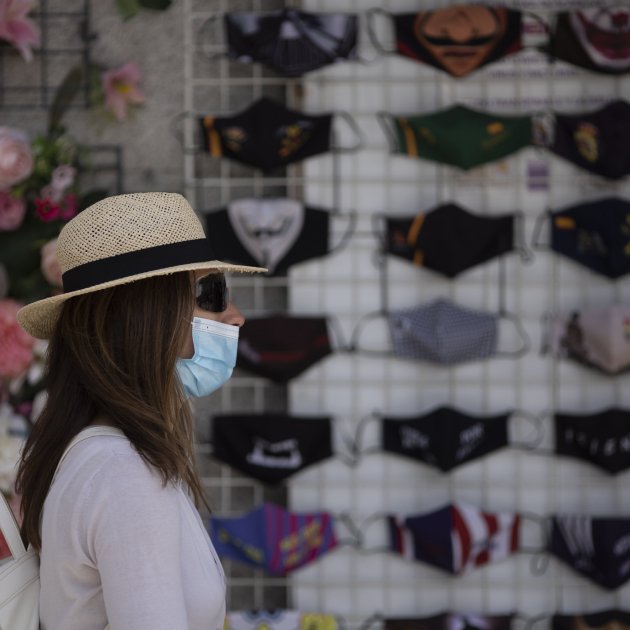The epidemiological situation in Catalonia has reached a critical point. In the last day the EPG outbreak risk, which is considered high when it is above 100, has continued with its unstoppable rise to reach 978 points; it has thus multiplied by 10 in the last two weeks. The figures for new confirmed cases are similar to those for the second wave of the virus in Catalonia and Spain. Catalan health authorities do not rule out a new toughening up of the recently-eased Covid measures "if the situation requires it".
In the last 24 hours, 3,563 new cases have been registered, a figure similar to that of Saturday and, in fact, far below those of the previous consecutive three days when more than 5,000 new infections were added daily, but there is a "weekend effect" that applies. Fewer tests are performed on Saturdays and Sundays, and this may be the cause in the data fall, rather than any change in the trend.
Evolution of coronavirus in Catalonia: Cases (blue), deaths (red)
Among the indicators that continue to rise relentlessly are the Rt transmission index, which goes from 2.50 to 2.99. This means, that at present, every person who contracts with virus is spreading it to three others. The 14-day cumulative incidence (IA14), measuring the new cases per 100,000 people in the last two weeks, has risen from 280 to 337.97. In fact, since the EPG outbreak risk is partially based on the IA14, it can be considered as a prediction that the cumulative incidence is likely to continue rising rapidly unless other factors intervene.
In an interview with Catalunya Ràdio, the Catalan public health secretary, Carmen Cabezas, said that, looking at the current indicators, what worries her most is "the incidence among young people". The secretary's concern is more than justified, as in recent weeks the average age of those infected has fallen steadily: currently the average is just 26 years.
Death rate, lower than ever
The data on increases in infections contrasts with the fall in the number of deaths, day after day. Last week Catalonia recorded its lowest toll of deaths from coronavirus since the pandemic began: a total of seven deaths were reocrded. This downward trend has continued and in the last 24 hours one death has been recorded.
Deaths from coronavirus in Catalonia
Hospital occupancy by Covid patients also remains stable, although it has increased slightly over the last two days. Again, it has been sitting at a 15-month low - the lowest since the arrival of the coronavirus in early 2020. In Catalan hospitals yesterday, 22 new patients were admitted, bringing the total to 544, and two people were discharged from intensive care beds.
Intensive care places occupied by Covid patients in Catalonia
Vaccination progress and the Delta variant
The vaccination campaign continues to move forward in Catalonia, now including younger people, from the age of 16 onwards. You can book a jab online or by contacting your local primary care centre - although this Monday morning, there are reports of CAP health centres being inundated with Covid inquiries, including requests for PCR tests.
In the last day in Catalonia, 11,892 first doses have been administered, and 23,177 second doses. As a result, the population fully vaccinated climbs to 3,150,410, that is, 40% of the Catalan population.
Total of those vaccinated in Catalonia (yellow = first shot, green = second shot)
Cabezas noted that in the days ahead we will see an expansion in the number of second doses given, grater than the number of first jabs. This is due to the Catalan health strategy to ensure that there are a large number of Catalans - especially those who are older - who are fully protected. The secretary also announced that fewer Pfizer vaccines will arrive from Madrid this week, but allayed any kind of alarm, assuring that all this will not prevent the goal of group immunity from being achieved by the end of the summer.
Breakdown of those vaccinated in Catalonia (bright yellow = first shot, pale yellow = fully vaccinated)
The Catalan health authorities once again remind the public of the importance of getting their second shot and not relying only on a first dose. Cabezas remarked: "This is a two-dose strategy, especially in the face of the Delta variant. In June, we gave many people first doses, now they will get their second doses."
Total number vaccinated daily in Catalonia (first shot = blue, second shot = yellow)
New measures?
In her interview with Catalunya Ràdio, secretary Cabezas did not specify any changes to health measures, but did not rule out such changes if the situation so requires.
One of the main unknowns currently in the air is the possible return to tougher rules on masking up. The secretary opted to point out that the health department recommends using a mask outdoors as well, if you are not alone or in a cohabitation bubble. Cabezas recalled that the Catalan department cannot order a return to mask wearing, as this is the competency of the Spanish government, it can only recommend its use.
She also confirmed that detection protocols have been revised taking into account the current situation, in which a significant proportion of the population has already been vaccinated and therefore there is a changing profile for those likely to be infected or become seriously ill. The secretary considers it useless to maintain protocols that are designed for situations very different from those currently experienced.
Main image: Woman wearing a mask / Europa Press
